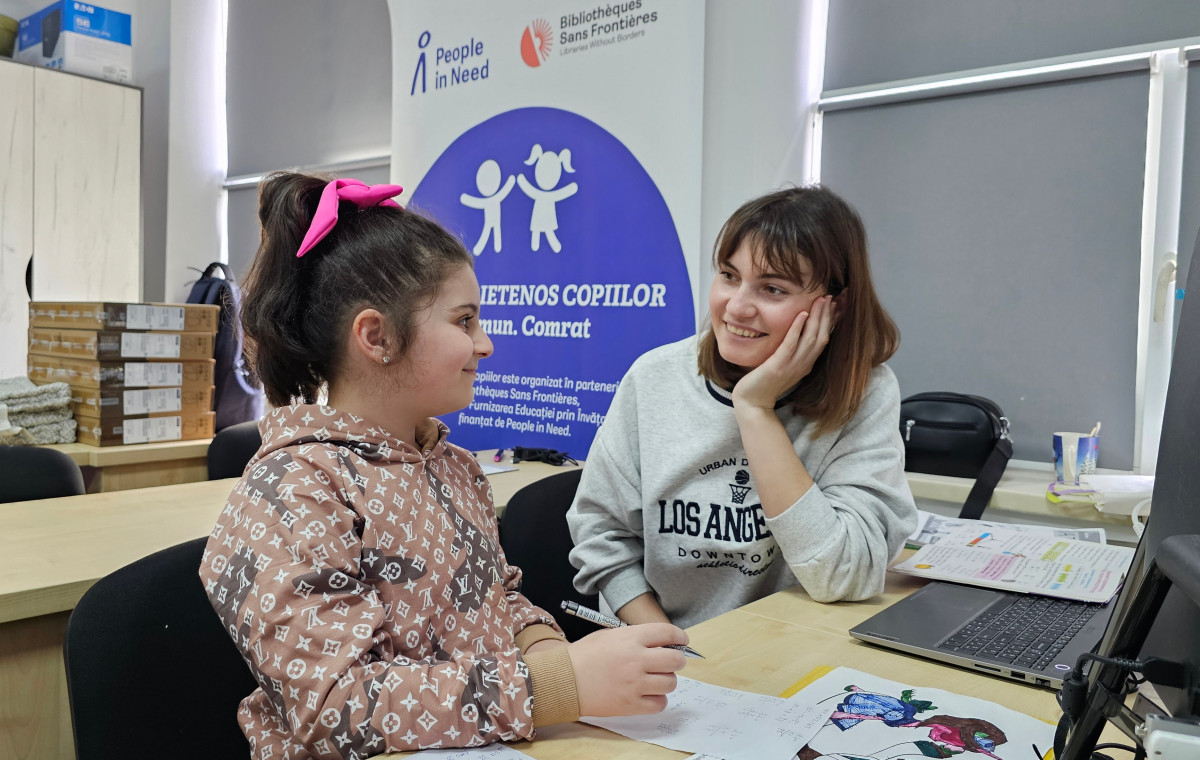Digital Learning Centre’s - a bridge to a brighter future for Roma children
Published: Apr 8, 2024 Reading time: 5 minutes Share: Share an articleOver the years, we have promoted education and inclusion everywhere we work. Special attention is paid to the educational process in conflict-affected areas. With the Republic of Moldova facing a massive influx of refugees from Ukraine after 24 February 2022, we have worked hard to provide war-displaced children with the fundamental right to education.

We have opened six Digital Learning Centres (DLCs) in different regions of the country, enabling children of different ethnicities from Ukraine and the host community to continue their education and facilitate their social integration. At one of these centres, in ATU Gagauzia, on the eve of International Roma Day, we met the family of Mihail and Zuhra, a Roma family who moved to Comrat from the Odesa region. We met them as they were registering one of their children at the DLC. We took the opportunity to talk to them briefly about the importance of education and the challenges their children face in the educational process.
How long have you already stayed in Moldova?
Zuhra: We came to Moldova about 4-5 months after the war started. It was tough for us at that time. There were sirens and explosions... The children were afraid; our eldest son was depressed in general, and he didn't want to leave the house. We hoped the war would be over soon, but in the end, we had to leave. We chose Moldova because I used to live here and we didn't want to be far from home. We chose the closest and safest place.
How many children do you have?
Zuhra: We have three children, two of whom are of school age. Our eldest son, Anatolii, attends the DLC, where he continues his studies. He doesn't have classes every day. From time to time the teachers give him homework to do. When this happens, he comes to the centre to do his homework.
Was it difficult for him to switch to online learning?
Zuhra: I wouldn't say it was difficult for him. Students in Ukraine have been familiar with this form of teaching since before the war, during the COVID-19 pandemic.
Mihail: It's not the same as if they went to a regular school. Of course, we would like our children to attend a regular school with lessons, different subjects, extra-curricular activities, etc. But given the circumstances, the online format is also very welcome.
Zuhra: The conditions here at the Digital Learning Centre are good; the children have everything they need.
And now you've decided to enrol your younger son?
Zuhra: Yes, it's just more difficult for him. Tristan is not computer literate; he can't even read or write. In 2022, he had just turned seven, and we wanted to enrol him in school, but because of the war, we had to leave the country. Now, we have discovered that there is a Ukrainian teacher at the DLC who can help Tristan and prepare him for the new school year. I want the teacher to teach him to read and write, and, God willing, he will be in first grade for the first time on 1 September. We want him to start his studies in Ukrainian so that when the war ends and we return home, he will be able to study in a Ukrainian-language school.
Although education is often not a priority in Roma communities, your family's example somehow breaks the pattern: you are looking for different ways to give your children knowledge, even in these difficult circumstances...
Zuhra: It's not like the old days. Now, everything is based on education; that's why we want children to be educated. For example, I didn't even finish secondary school. I did not have that opportunity, as you said, because of 'priorities'. I just finished six classes , learned to read and write and that's it—I don't want that for my children.
Mihail: In my time, there were the same priorities: more than 50 per cent of the children didn't learn or go to school. However, I managed to get a complete secondary education. My parents knew it was important; they made an effort, and I finished school. But, circumstances did not allow me to apply to university. Now, we are working hard for the younger generation. And we will try to make sure that our children not only finish school but also have the opportunity to continue their studies. They have to make maximum effort because they are at an age where they don't attach much importance to education. With time, they will realise that they should study twice as much.
What do you think the future holds for your family?
Zuhra: When the war is over, of course, we will go back home. But if the fighting continues, we will have to stay here.
Mihail: We'll try to be where it's safe for the children first. But we are counting on the war to end, that we will all soon have peaceful skies above us, and that we will be able to return home. We want nothing more. Life abroad is challenging. When you live your life somewhere and then have to start all over again somewhere else, it is not very easy. That's why all the help we can get is so important. The support we have received from People in Need, access to education for children, and providing them with winter clothes has helped us a lot; thank you very much.
At the time of this article's publication, Tristan—Mihail and Zuhra's youngest—son has successfully begun attending the Digital Learning Centre in Comrat, where our facilitators are teaching him the necessary skills and preparing him for the new school year.


